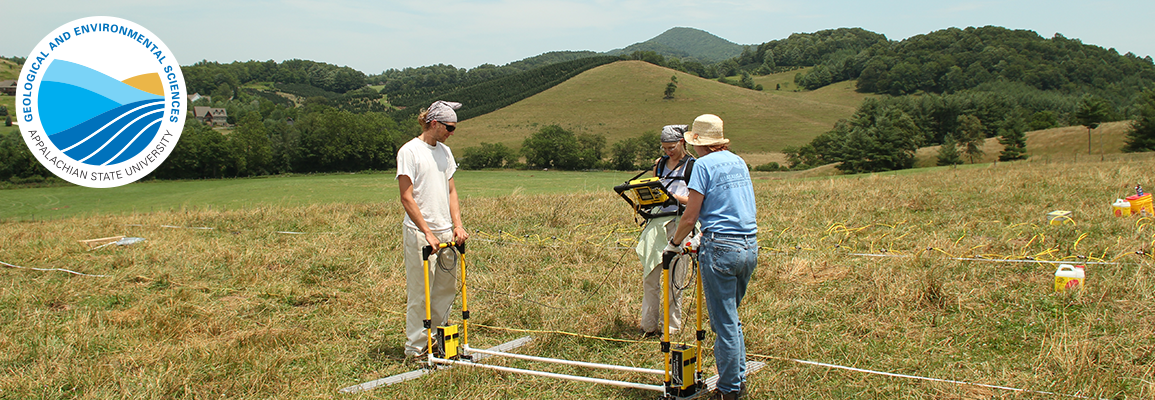Environmental Science (BS) - Earth Systems Science
The Earth Systems Science degree track is a flexible, interdisciplinary program of study that is geared towards students' specific career goals in the earth and environmental sciences. Students take classes in geology, physics, chemistry, calculus, statistics, and biology, and then pick an area of focus from the following: surface procesess, hydrosphere, atmosphere, earth materials, or biosphere. Due to its interdisciplinarity, this program of study is best suited for students that have some sense of what they want to do for a career. Please talk to your GES advisor as soon as possible about which area of focus would be most appropriate for your post-graduation plans.
Environmental Science (BS) - Earth Systems Science (121C)
Earth Systems Science Electives (24 Hours)
These are the electives for area of interest for students on the Earth Systems Science concentration (starting Fall 2024). This list is not relevant to students on the Earth Systems Science programs of study with a catalog year of 2023 or earlier.
These courses are subject to change.
Choose 15 hours from one area + 9 from other area(s). If a course is chosen in one category, it may not be used elsewhere in the program of study (e.g., if GES 3140 was chosen in the Computational and Multivariate Data Analysis Courses above, it cannot be applied in the Hydrosphere or Atmosphere electives below). Courses in this section may still be double counted towards gen ed requirements as allowed.
Your GES advisor will work with you to during advising to select your chosen set of electives, which will then show up in DegreeWorks as required classes. Link to elective selection spreadsheet is here (students cannot select elective focus, only GES advisors have access to this document).
At least 15 credit hours total must be from laboratory classes at the 2000 level or higher (marked with a *).
Surface Processes Electives
- GES 3810 - The Reef Environment and Geology of Modern Carbonate Systems (3)*
- GES 2751 - Geology Field Methods (2)*
- GES 3140 - Quantifying Environmental Change (3)*
- GES 3150 - Principles of Structural Geology and Tectonics (3)*
- GES 3333 - Geomorphology (3)*
- GES 3680 - Geoarchaeology (3)
- GES 3160 - Introduction to Geophysics (3)*
- GES 3800 - Sedimentology & Stratigraphy (3)*
- GES 4705 - Engineering Geology (3)*
- GHY 3110 - Ecoregions and Dynamic Landforms (3)
- SD 3155 - Soil and Soil Fertility Management (3)
Hydrosphere Electives
- GES 3140 - Quantifying Environmental Change (3)*
- GES 3810 - The Reef Environment and Geology of Modern Carbonate Systems (3)*
- GES 4705 - Engineering Geology (3)*
- BIO 3310 - Marine Sciences (4)*
- CHE 4620 - Environmental Chemistry (4)*
- CHE 2210 - Quantitative Analysis (3) and CHE 2211 - Quantitative Analysis Laboratory (1)*
- GHY 3100 - Weather and Climate (3)
- GHY 3600 - Snow and Ice (3)
- IDS 3010 - H2O: We are Water (3)
- TEC 4607 - Wind and Hydro Power Technology (3)
- TEC 3606 - Sustainable Water and Wastewater Technology (3)
Atmosphere Electives
- BIO 3320 - Air Pollution Effects on Plants and People (3)
- CHE 2600 - Global Atmospheric Chemistry (3)
- CHE 4620 - Environmental Chemistry (4)*
- GHY 3100 - Weather and Climate (3)
- GHY 4620 - Atmospheric Circulation (3)
- PHY 3150 - Atmospheric Science (3)
- PHY 3140 - Environmental Physics (3)
- GES 3140 - Quantifying Environmental Change (3)*
Earth Materials Electives
- GES 2451 - Geological Sample Preparation (1)*
- GES 2751 - Geology Field Methods I (2)*
- GES 3220 - Fundamentals of Mineralogy (3)*
- GES 3715 - Petrology and Petrography (3)*
- GES 3025 - Principles of Paleontology (3)*
- GES 3150 - Principles of Structural Geology and Tectonics (3)*
- GES 3160 - Introduction to Geophysics (3)*
- GES 3680 - Geoarchaeology (3)
- GES 4705 - Engineering Geology (3)*
- CHE 2210 - Quantitative Analysis (3) and CHE 2211 - Quantitative Analysis Laboratory (1)*
- PHY 4860 - Physical Principles of Electron Microscopy (4)
- PHY 4845 - Nanoscience and Technology (3)
- BIO 4564 - Microscopy (4)*
Biosphere Electives
- GES 3025 - Principles of Paleontology (3)*
- BIO 2000 - Introduction to Botany (4)*
- BIO 3302 - Ecology (4)*
- BIO 3313 - Global Change Ecology (4) [WID]*
- BIO 3315 - Conservation Biology (3) [WID]
- BIO 4240 - Aquatic Biology (4)*
- BIO 4555 - Plant Physiology (4)*
- BIO 4575 - Ecotoxicology (4) [CAP]*
- BIO 4620 - Landscape Ecology (4)*
- BIO 3330 - Local Flora (4)*
- CHE 2101 - Fundamentals of Organic Chemistry (3) and CHE 2102 - Fundamentals of Organic Chemistry Laboratory (1)* - or - CHE 2201 - Organic Chemistry I (3) and CHE 2203 - Organic Chemistry Laboratory I (1)*
- GHY 3130 - Geography of Biodiversity (3)
- SD 3100 - Principles of Agroecology (3)
- SD 3200 - Agroforestry and Farm Forestry Systems (3)
- SD 3420 - Agroecology for Climate Action (3) [WID]
